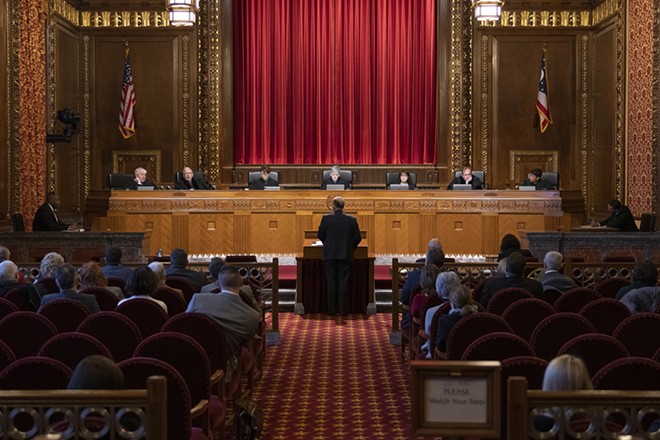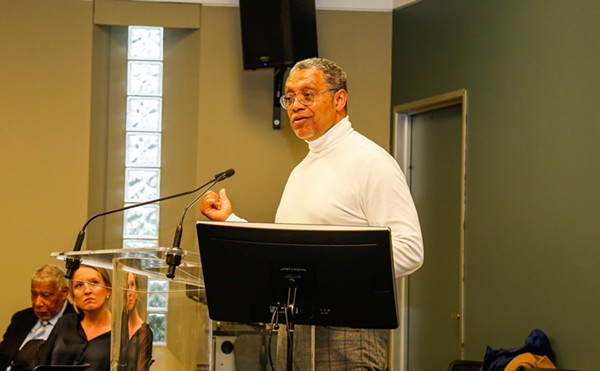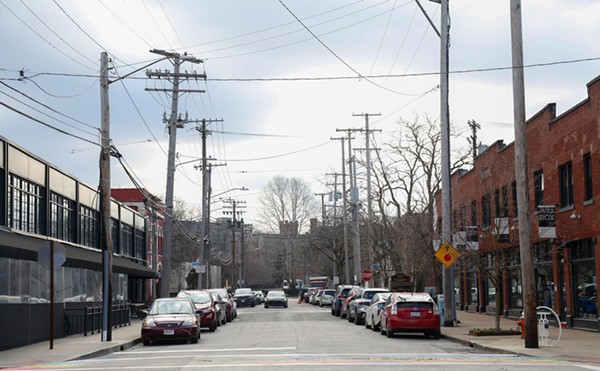The Ohio Supreme Court will soon decide whether to overturn a state law that prohibits people accused of violent crimes from possessing guns.
In 2017, authorities indicted a man named Delvonte Philpotts on accusations of rape, kidnapping and assault. While released on bond, Philpotts posted several photos on social media depicting himself carrying and wielding a pistol. One of the photos mentions he was instructed not to keep weapons.
Police then arrested and charged Philpotts, 24, with an additional offense of carrying a weapon while under indictment for a violent felony. Prosecutors ultimately dropped the rape, kidnapping and assault charges. However, Philpotts pleaded no contest to the weapons charge, which accepts the conviction without any factual admission of guilt.
Attorneys from the Public Defender’s office representing Philpotts are asking the Ohio Supreme Court to overturn the state law prohibiting people under indictment from possessing weapons. They argue it violates the Second Amendment and due process rights of suspects, who are presumed innocent until proven guilty.
Last week, the Supreme Court asked both sides to file additional arguments regarding how a recent U.S. Supreme Court ruling that overturned New York’s prohibition against citizens carrying a concealed weapon without a permit would affect the Ohio case.
A ruling for Philpotts would be a weakening of Ohio’s gun laws. The case is somewhat unusual in that it’s a public defender, rather than a gun advocacy organization, pressing the change. It could also leave the justices ruling on a politically charged issue just before several of them are up for re-election in November. Justice Jennifer Brunner, a liberal who’s running for the chief justice seat, dissented from the court’s request last week for additional filings, arguing that this is the wrong case for the matter.
Since the events giving rise to the Supreme Court case, a Cuyahoga County judge convicted Philpotts for aggravated murder and four related charges. Philpotts was accused of shooting and killing another man after arranging to purchase his iPhone. Philpotts was sentenced to life in prison with the life in prison with eligibility for parole after 25 years. Judges in the Eighth Appellate District upheld the convictions.
Philpotts argued he lives in a violent area and uses the weapon to defend himself. Given he was only accused of a crime and not later convicted of it, he argued it’s unconstitutional to remove his right to that protection.
“The Second Amendment continues to extend its protections to those merely accused of crimes, and conversely has never been interpreted to exclude preemptively those who have not yet, or ever, been convicted of a felony,” his attorneys wrote.
Prosecutors raised several issues with this argument. For one, they cited another provision in Ohio’s gun laws that allow people who are under indictment to petition the court to reclaim their weapons rights. Philpotts, they said, never even asked.
Secondly, they challenged his claims of using the weapons in self-defense. They included in court filings four photos of Philpotts posted on his Instagram account holding a pistol. One bears the caption, “Dey told me ‘no weapons’ but you know I’m hard headed.” Another shows his pointing a pistol at the camera with the caption “everything dead in dem trenches.”
They described this as Philpotts not only breaking the law but “flaunting” his weapon.
Philpotts’ attorney did not respond to a phone call. The Cuyahoga County prosecutor’s office declined to comment, citing pending litigation.
The Ohio Association of Prosecuting Attorneys didn’t file arguments with the court. However, in a statement, executive director Lou Tobin said the state bears a strong interest in maintaining public safety and preventing gun violence.
“The second amendment does not prevent restrictions on classes of people who present a present danger to others, and individuals who are under indictment for crimes of violence present a unique risk of danger to their victims, to other witnesses, and to the community,” he said.
The Ohio Public Defender’s Office declined to comment on the specific case. Speaking more broadly, however, spokeswoman Niki Clum said public defenders are duty bound to advocate for their clients and provide a proper defense no matter the charges.
“If a public defender identifies a constitutional issue that needs to be raised in a case, it is their job, as an advocate, to raise those claims regardless of whatever charges their client may have faced in the past or may face in the future,” she said. “Everyone’s constitutional rights must be protected, and that is what public defenders do every day.”
A spokeswoman for the ACLU declined to comment.
A lobbyist for the Buckeye Firearms Association, which advocates for laxer gun laws, didn’t respond to inquiries.
Originally published by the Ohio Capital Journal. Republished here with permission.












